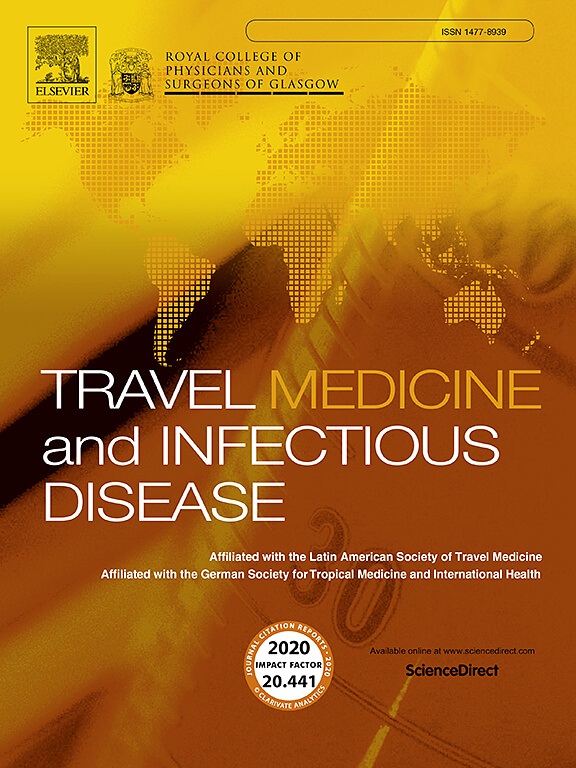在拉丁美洲和亚太开展的长期随机登革热疫苗试验中开展发热监测的业务挑战和经验教训。
IF 4.7
3区 医学
Q1 INFECTIOUS DISEASES
引用次数: 0
摘要
背景:在试验中,登革热疫苗功效评估依赖于出现发热性疾病/临床疑似登革热的参与者在短时间内联系研究地点进行样本收集和临床评估。在这里,我们提出了在评估TAK-003疗效的试验中保持高度遵守发热监测程序的关键考虑因素。方法:DEN-301 (NCT02747927)是一项随机3期试验,在拉丁美洲(LATAM)和亚太(APAC)八个登革热流行国家的儿童/青少年中进行。发热监测包括每周与参与者接触,以确定发热病例(≥38°C;连续三天中的两天)。采集血样进行分子检测,最好是发热≤5天,并由调查人员进行彻底的临床评估。数据是描述性的。结果:20,071例(LATAM, 11,080例;在亚太地区,8991名接受TAK-003/安慰剂的参与者中,18260名(91.0%)完成了4.5年的随访。发热性疾病的总发病率为30 (LATAM, 26.0;亚太地区,每100人年35.1例。急性期标本检出率为98.1%。发热5天后采集样本的总体比率为6% (LATAM, 10%;亚太地区,2%)。在实施了2017年每个研究地点量身定制的交通、参与和医疗援助等措施后,观察到遗漏/窗外样本减少的趋势,这些措施在COVID-19大流行期间似乎有所增加。结论:热监测方案的设计保证了试验的高依从性。在方案之外保持参与和获得卫生保健对于改善发热≤5天的发热病例评估非常重要。本文章由计算机程序翻译,如有差异,请以英文原文为准。
Operational challenges and lessons learned from conducting febrile surveillance in a long-term randomized dengue vaccine trial in Latin America and Asia-Pacific
Background
In trials, dengue vaccine efficacy evaluation relies on participants presenting with febrile illness/clinically suspected dengue contacting the study site for sample collection and clinical assessment within a short timeframe. Here, we present key considerations to maintain high compliance with the febrile surveillance procedures in a trial that assessed TAK-003 efficacy.
Methods
DEN-301 (NCT02747927) is a randomized phase 3 trial in children/adolescents from eight dengue-endemic countries in Latin America (LATAM) and Asia-Pacific (APAC). Febrile surveillance consisted of weekly contact with the participant to identify cases of fever (≥38 °C; two of three consecutive days). Blood samples were collected for molecular testing, preferably ≤5 days of fever onset, together with thorough clinical assessment by the investigators. The data are presented descriptively.
Results
Of the 20,071 (LATAM, 11,080; APAC, 8991) participants who received TAK-003/placebo, 18,260 (91.0 %) completed 4.5 years of follow-up. The overall incidence of febrile illness was 30 (LATAM, 26.0; APAC, 35.1) cases per 100 person-years. The rate samples collected during the acute phase was 98.1 %. The overall rate of samples collected after 5 days of fever onset (missed/out-of-window) was 6 % (LATAM, 10 %; APAC, 2 %). A trend toward reduced missed/out-of-window samples was observed after implementing measures, such as transportation, engagement, and healthcare aid tailored per study site in 2017, which appeared to increase during the COVID-19 pandemic.
Conclusion
The design of the febrile surveillance protocol ensured high compliance in the trial. Maintaining engagement and access to healthcare beyond the protocol was important in improving febrile case evaluation ≤5 days of fever onset.
求助全文
通过发布文献求助,成功后即可免费获取论文全文。
去求助
来源期刊

Travel Medicine and Infectious Disease
PUBLIC, ENVIRONMENTAL & OCCUPATIONAL HEALTH-INFECTIOUS DISEASES
CiteScore
19.40
自引率
1.70%
发文量
211
审稿时长
49 days
期刊介绍:
Travel Medicine and Infectious Disease
Publication Scope:
Publishes original papers, reviews, and consensus papers
Primary theme: infectious disease in the context of travel medicine
Focus Areas:
Epidemiology and surveillance of travel-related illness
Prevention and treatment of travel-associated infections
Malaria prevention and treatment
Travellers' diarrhoea
Infections associated with mass gatherings
Migration-related infections
Vaccines and vaccine-preventable disease
Global policy/regulations for disease prevention and control
Practical clinical issues for travel and tropical medicine practitioners
Coverage:
Addresses areas of controversy and debate in travel medicine
Aims to inform guidelines and policy pertinent to travel medicine and the prevention of infectious disease
Publication Features:
Offers a fast peer-review process
Provides early online publication of accepted manuscripts
Aims to publish cutting-edge papers
 求助内容:
求助内容: 应助结果提醒方式:
应助结果提醒方式:


